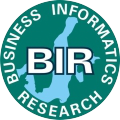
The 23rd installment of the International Conference on Perspectives in Business Informatics Research (BIR 2024) upholds the legacy of yearly gatherings aimed at broadening perspectives and inspiring fresh pathways for Business Informatics, Business Information Systems, and Information Systems Engineering. This event encompasses essential research as well as critical application domains and aims to cultivate an intellectually vibrant environment conducive to the scholarly exchange of research findings and ideas among academics, practitioners, and doctoral scholars.
Information and Communication Technology (ICT) plays an increasingly important role in organizations, inter-organizational networks, society and individuals' daily life. Business operations rely extensively on intricate, dispersed software systems that function within dynamic and frequently erratic business landscapes. In this context, the research discipline of Business Informatics holds paramount importance.
In order to produce and supply products and services more efficiently organizations must be able to adapt and quickly exchange information with internal and external collaborators and customers. Demand for increasing interoperability exists at technological, business process, and knowledge levels. Methods, theories, and tools that maintain change and adaptation of business processes, organizations, and their supporting software are needed. Furthermore, recent challenges are directed to more human-oriented, highly personalized and trustworthy, high-quality systems enabling their users to cope with the large variety of frameworks, technologies and tools needed to accommodate emerging business applications.
Research contributions for the conference will be on aspects of and future directions in Business Informatics Research with respect to the above-mentioned theme of interoperability and adaptation, as well as on exploring scientifically the practical aspects and establishing empirically grounded analyses of business cases in order to provide a better evaluation to the applications of ICT in industry. Contributions from both ongoing research and implications for future directions are welcome.
The BIR conference series create a forum where researchers in business informatics, seniors as well as juniors, could meet and discuss with each other. The main theme of BIR 2024 is Artificial Intelligence in Business Informatics: Opportunities and Challenges. BIR 2024 welcomes papers from all over the world. We accept original papers of the following types: full research papers, research-in-progress papers, industrial papers. Doctoral Consortium and workshops will also take place at BIR 2024.
The conference papers should be focused on but not limited by following topics:
AI Opportunities and Challenges in Business Informatics
• Ethical and responsible AI use • AI model performance and tuning for business • Ontology modelling languages and AI • Data quality and integration • Algorithm selection and optimization • Model validation and evaluation • Predictive analytics • Privacy and security • Explainability and Interpretability of AI ModelsBusiness, people and systems interoperability
• Philosophical and social perspectives of interoperability • Ontological foundations of Business Informatics • Systems theory and principles • Conceptual modelling • Human oriented systems • Emerging technologies and paradigms • Methods, architectures and communication technologies supporting interoperability • Enterprise modelling and virtual organisations • ERP, CRM and SCM systems • e-commerce, e-business, e-governmentBusiness intelligence
• Business intelligence systems • Data warehousing • Decision support systems • Databases for business • Competing on analytics • Healthcare/Medical InformaticsOpenness in business informatics
• Open source development and deployment tools • Interoperability of open source communities • Integrating open source technology with commercial and proprietary products • Open innovation • Open data • Web and social computingBusiness and information systems development
• Business process modelling and Workflow management • Model Driven and Service Oriented architecture architecture (MDA, SOA) • Requirements engineering and Business rules • Object oriented techniques and methodologies • Quality of business software ans IS security issuesKnowledge Management and Semantic Web
• Knowledge management in interconnected world • Linked data • Semantic Web methods and languages • Ontology modelling languages and tools • Ontology applications in business • E-learning and learning organizationsContextualized evaluation of business informatics
• Feasibility of existing techniques and languages • Contextualized value and quality • User acceptance of new technology • Curriculum design and implementation issues • Case studies and experience reports • Project and risk management issues
In recent years, the landscape of business informatics and artificial intelligence (AI) has undergone a significant transformation, particularly in the context of democratizing advanced AI tools for businesses. This keynote presentation delves into the evolution of AI integration within business processes, highlighting the pivotal shift from the necessity of in-house expert data science teams to the accessible, cost-effective implementation of Foundation Models, including Large Language Models (LLMs) and diffusion models. The talk underscores the profound impact of the rapid development of the AI ecosystem, cloud tools, ML/LLM libraries, and no-code/low-code platforms on lowering the entry barriers for companies aiming to innovate within the realms of business intelligence (BI), data science, and machine learning (ML).
The presentation explores the paradigm shift in software engineering, propelled by AI-driven tools like GitHub Copilot, which poses both a challenge and an opportunity for the software development profession. This technological evolution not only necessitates a transformation in the skill set and roles of software engineers but also significantly impacts the cost dynamics and availability of skilled professionals. The democratization of AI tools, as discussed, is not merely a technological advancement but a catalyst for organizational innovation, enabling companies to swiftly develop and deploy AI-driven products and services by leveraging existing AI technologies and benefiting from reduced human capital expenses.
In line with the main theme of BIR 2024, "Artificial Intelligence in Business Informatics: Opportunities and Challenges," this talk aims to bridge the theoretical and practical aspects of business informatics research with the latest trends in AI development. It emphasizes the importance of adaptability, interoperability, and the need for a human-oriented approach in designing high-quality, trustworthy AI systems that cater to the evolving needs of businesses and consumers alike.
The session will provide valuable insights for academics, practitioners, and doctoral scholars interested in the intersection of AI and business informatics, offering a comprehensive overview of the current state and future directions of AI tools in business innovation. Attendees will gain a deeper understanding of the opportunities and challenges posed by AI in business informatics, fostering an intellectually stimulating environment conducive to the exchange of ideas and advancements in the field.

Jan Romportl is the CEO of Elin.ai, AI researcher, entrepreneur, consultant, and executive with more than 20 years of experience in the field. Before fully moving to the startup and freelance world in 2022, Jan worked for seven years as the Chief Data Scientist at O2 Czech Republic and was the founder and CEO of Dataclair.ai – Centre for Artificial Intelligence of O2 and PPF, the largest corporate finance group in the region. He holds Ph.D. in Artificial Intelligence, master’s degree in cybernetics and control engineering, and another master’s degree in philosophy. Before moving to the commercial space back in 2015, Jan had already had 12 years of academic research and teaching experience in AI, man-machine interaction, speech technologies and philosophy under his belt. He served as the Head of Department of Man-Machine Interaction at New Technologies Research Centre, University of West Bohemia, and a senior researcher at Department of Cybernetics. Jan is still a member of the Department of Philosophy at the same university and cooperates with the Centre for Theoretical Study of Charles University and with Czech Effective Altruism Group. Jan organizes Prague AI Safety Meetup, tries to be useful in the Czech AI Safety and Alignment community, and he’s involved in the global movement for minimization of existential risks. Jan is a taekwondo practitioner, runner, PADI divemaster, private pilot and a hobby-philosopher. He’s also a lifelong Atari enthusiast and vintage computer collector.
Cyber-human systems are systems formed by the coordinated interaction of human and computational components. The latter can only be justified in these systems to the extent that they are meaningful to humans – in both senses of ‘meaning’, i.e., in the sense of semantics as well as in the sense of purpose or significance. On one hand, the data these components manipulate only acquire meaning when mapped to shared human conceptualizations of the world. On the other hand, they can only be justified if ethically designed. Ultimately, we can only build trustworthy cyber-human systems if the interoperation of their components is meaning preserving, i.e., if we are able to: semantically interoperate these components; transparently demonstrate (i.e., explain) how their interoperation positively contributes to human values and goals. To meet these requirements, we must be able to explicitly reveal and safely relate the different theories of the world (i.e., ontologies) embedded in these components. In this talk, I discuss the strong relation between the notions of semantics, ontology, and explanation under certain interpretations. Specifically, I will present a notion of explanation termed Ontological Unpacking, which aims at explaining symbolic domain descriptions (conceptual models, knowledge graphs, logical specifications). I show that the models produced by Ontological Unpacking differ from their traditional counterparts not only in their expressivity but also in their nature: while the latter typically merely have a descriptive nature, the former have an explanatory one. Moreover, I show that it is exactly this explanatory nature that is required for semantic interoperability and, hence, trustworthiness. Finally, I discuss the relation between Ontological Unpacking and other forms of explanation in philosophy and science, as well as in Artificial Intelligence. I will argue that the current trend in XAI (Explainable AI) in which “to explain is to produce a symbolic artifact” (e.g., a decision tree or a counterfactual description) is an incomplete project resting on a false assumption, that these artifacts are not “inherently interpretable”, and that they should be taken as the beginning of the road to explanation, not the end.
Presentation slides

Giancarlo Guizzardi is a Full Professor of Software Science and Evolution as well as Chair and Department Head of Semantics, Cybersecurity & Services (SCS) at the University of Twente, The Netherlands. He is also an Affiliated/Guest Professor at the Department of Computer and Systems Sciences (DSV) at Stockholm University, in Sweden. He has been active for nearly three decades in the areas of Formal and Applied Ontology, Conceptual Modelling, Business Informatics, and Information Systems Engineering, working with a multi-disciplinary approach in Computer Science that aggregates results from Philosophy, Cognitive Science, Logics and Linguistics. Over the years, he has delivered keynote speeches in several key international conferences in these fields (e.g., ER, BPM, CAiSE, IEEE ICSC). He is currently an associate editor of a number of journals including Applied Ontology and Data & Knowledge Engineering, a co-editor of the Lecture Notes in Business Information Processing series, and a member of several international journal editorial boards. He is a member of the Steering Committees of ER, EDOC, and IEEE CBI, and of the Advisory Board of the International Association for Ontology and its Applications (IAOA). Finally, he is an ER Fellow.

Mārīte Kirikova, Riga Technical University, Latvia (Chair)
Björn Johansson, Linkoping University, Sweden (Co-Chair)
Kurt Sandkuhl, Rostock University, Germany
Robert Buchmann, University of Cluj-Napoca, Romania
Rimantas Butleris, Kaunas Technical University, Lithuania
Sven Carlsson, Lund University, Sweden
Peter Forbrig, Rostock University, Germany
Dimitris Karagiannis, University of Vienna, Austria
Andrzej Kobyliñski, Warsaw School of Economics, Poland
Raimundas Matulevičius, University of Tartu, Estonia
Lina Nemuraitė, Kaunas Technical University, Lithuania
Jyrki Nummenmaa, University of Tampere, Finland
Malgorzata Paňkowska, University of Economics, Katowice, Poland
Andrea Polini, University of Camerino, Italy
Václav Řepa, Prague University of Economics and Business, Czech Republic
Janis Stirna, Stockholm University, Sweden
Benkt Wangler, University of Skövde, Sweden
Václav Řepa, Prague University of Economics, Czech Republic
Raimundas Matulevicius, University of Tartu, Estonia. Emanuele Laurenzi FHNW, Switzerland.
Anne Gutschmidt, The University of Rostock, Germany. Ana-Maria Ghiran, University of Cluj-Napoca, Romania.
Bjorn Johansson, Linköping University, Sweden. Filip Vencovský, Prague University of Economic and Business, Czech Republic.
Gundars Alksnis, Riga Technical University, Latvia Said Assar, Institut Mines-Telecom Business School, France Per Backlund, University of Skövde, Sweden Peter Bellström, Karlstad University, Sweden Catalin Boja, Bucharest Academy of Economic Studies, Romania Dominik Bork, TU Wien, Austria Tomáš,Bruckner, Prague University of Economics and Business, Czechia Robert Andrei Buchmann, Babeș-Bolyai University of Cluj Napoca, Romania Chiara Di Francescomarino, DISI - University of Trento, Italy Antinisca Di Marco, University of L'Aquila, Italy Peter Forbrig, University of Rostock, Germany Ana-Maria Ghiran, Babes-Bolyai University of Cluj-Napoca, Romania Jānis Grabis, Riga Technical University, Latvia Anne Gutschmidt, The University of Rostock, Germany Knut Hinkelmann FHNW University of Applied Sciences and Arts Northwestern Switzerland Switzerland Mubashar Iqbal, University of Tartu, Estonia Amin Jalali, Stockholm University, Sweden Dimitris Karagiannis, University of Vienna, Austria Michael Alexander Kaufmann, Lucerne University of Applied Sciences and Arts, Switzerland Marite Kirikova, Riga Technical University, Latvia Emanuele Laurenzi, University of Applied Sciences and Arts Northwestern Switzerland, Switzerland Michael Le Duc, Mälardalen University, Sweden Moonkun Lee, Chonbuk National University, South Korea Francisco J Lopez-Pellicer, University of Zaragoza, Spain Ginta Majore, Vidzeme University of Applied Sciences, Latvia Andreas Martin, FHNW University of Applied Sciences Northwestern Switzerland, Switzerland Raimundas Matulevicius, University of Tartu, Estonia Andrea Morichetta, University of Camerino, Italy Anastasija Nikiforova, University of Tartu, Estonia Jacob Nørbjerg, Copenhagen Business School, Denmark Jyrki Nummenmaa, Tampere University, Finland Victoria Paulsson, Linköping University, Sweden Jens Myrup Pedersen, Aalborg University, Dept. of Electronic Systems, Denmark Pierluigi Plebani, Politecnico di Milano, Italy Paul Pocatilu, Bucarest University of Economic Studies, Romania Andrea Polini, University of Camerino, Italy Barbara Re, university of Camerino, Italy Ben Roelens, Open Universiteit, Ghent University, Netherlands Christian Sacarea, Babes-Bolyai University, Romania Kurt Sandkuhl, The University of Rostock, Germany Hanlie Smuts, University of Pretoria, Pretoria, South Africa, South Africa Oleg Svatoš, Prague University of Economics and Business, Czechia Ann Svensson, University West, Sweden Torben Tambo, Aarhus University, Denmark Pedro Valderas, Universitat Politecnica de Valencia, Spain Filip Vencovský, Prague University of Economics and Business, Czechia Gianluigi Viscusi, Linköping University, Sweden Anna Wingkvist, Linnaeus University, Sweden Hans-Frieder Witschel, FHNW University of Applied Sciences and Arts Northwestern Switzerland, Switzerland Endri Xhina, University of Tirana, Albania Jelena Zdravkovic, Stockholm University, Sweden Alfred Zimmermann, Reutlingen University, Germany
Oleg Svatoš, Prague University of Economics and Business, Czech Republic.
Veronika Kostrouchová, Prague University of Economics and Business.
Dana Malcová, Prague University of Economics and Business.


Paper submissions deadline: May 5, 2024
Paper submissions extended deadline: May 20, 2024
Notification of acceptance: June 17, 2024
Camera ready: June 24, 2024
Workshop papers submissions: July 7, 2024
Workshop papers notification of acceptance: July 24, 2024
(for details see the workshops page)
Doctoral Consortium paper submissions: July 7, 2024
Notification of doctoral papers acceptance: July 24, 2024
Doctoral papers camera ready: August 21, 2024

Program is subject of change

ManComp 2024 paper submissions until July 7, 2024
Managing complexity has a long tradition for algorithms and general problems. However, it is an important issue also in Business Informatics domain. Here the complexity of different systems and systems of systems has to be managed. While complexity usually associates with large or very large scale systems still managing complexity is important even for systems with small sizes operating in complex environment. Nowadays informatics requires handling complexity at different levels and configurations of social, physical, enterprise, software, and hardware systems. The workshop is planned to focus on approaches and methods for managing complexity in the domain of applied informatics that may concern interplay of systems and ecosystems of various sizes and substances. Its purpose is to share and transfer knowledge on complexity identification, representation, controlling and reduction as well as to exploit possible synergies in development of innovative complexity handling strategies, approaches, and methods.
OMiLAB-KNOW 2024 paper submissions until July 7, 2024
The workshop aims to stimulate discussions on the requirements, use, design decisions, tooling, and evaluations regarding domain-specific conceptual modeling methods in the context of Business Informatics Research. Discussions will be facilitated by the ongoing activities and experiences of nodes within the OMiLAB network and community of practice, drawing from insights and lessons learned from recent projects where modeling methods played a pivotal role. The outcomes from the network members include modeling tools, modeling method components or extensions, model-driven artifacts, applications of domain-specific modeling, and empirical and explorative evaluation strategies. OMiLAB nodes are invited to share with the community the latest artifacts and lessons learned, along with any visions that may potentially lead to them. Researchers and educators outside the OMiLAB network who are active in knowledge engineering, enterprise modeling, and domain-specific modeling are also encouraged to contribute to the workshop. Particularly those with an interest, in the value of conceptual models and the diversity of modeling purposes they serve. Knowledge exchanges with other modeling-centric communities are expected to drive debates and positions reflecting diverse perspectives. Both insights from empirical experimentation and design-oriented research are welcome. The integration of conceptual modeling topics in curricular contents and associated teaching experiences are also typical areas of interest within the workshop’s scope. Various stages of research progress can be reported in the workshop submissions - from (short) position and vision papers to (full) research papers, tool demos, and experience reports.
BITA 2024 paper submissions until July 7, 2024
This workshop aims to bring together people who have an interest in BITA. We invite and appreciate researchers and practitioners from industry and academia to submit original results of their completed or ongoing projects. A contemporary challenge for enterprises is to keep up with the pace of changing business demands imposed on them. There is today an obvious demand for continuous improvement and alignment in enterprises. BITA is many times manifested through the transition of taking an enterprise from one state (AS-IS) into another improved state (TO-BE). Recent development within digitalization, digital transformation, smart products (value proposal) and smart operations (value adding) has brought new dimensions to BITA where smart business ecosystems is an emerging trend. A continuous BITA challenge is to move beyond a limited focus on one tradition or technology. There is a need to be able to deal with multi-dimensions of the enterprise in order to create alignment between business and IT. Examples of such dimensions are organizational structures, strategies, architectures, business models, work practices, processes, and IS/IT structures. IT governance is also a dimension that traditionally has had a strong impact on BITA. There are ordinarily three governance mechanisms that an enterprise needs to have in place: 1) decision-making structures, 2) alignment process, and 3) formal communications.

The BIR 2024 Doctoral Consortium provides doctoral students an opportunity to present and discuss their research on topics of BIR 2024 under the guidance of a panel of experienced researchers. We invite doctoral students share their work with fellow students and senior researchers in the field by submitting an article of 8 pages by July 7th 2024.
The Doctoral Consortium has the following objectives:
Each submitted paper will be reviewed by at least two members of the Doctoral Consortium Programme Committee (to be defined). The main evaluation criteria are: originality, significance, technical soundness and presentation.
Björn Johansson, Linkoping University, Sweden
Filip Vencovský, Prague University of Economics, Czech Republic
Doctoral Consortium papers of 8 pages in English, formatted according to the Springer Instructions for LNBIP authors, should be submitted by
Submissions platform
Accepted Doctoral Consortium papers will be published in the CEUR proceedings, presented at the Doctoral Consortium track and as posters at the conference.
Paper submissions: July 7, 2024
Notification of acceptance: July 24, 2024
Camera ready: August 21, 2024
6 faculties, 14000 students, Ranked 18th in Financial Times Masters in Management and 62nd in European Business School Ranking.
Faculty of Informatics and Statistics, dpt. of information technologies. Placed at náměstí W. Churchilla 4, 130 67 Praha 3 (W. Churchill Sq. 4, 130 67 Prague 3, Czech Rep.)
Near tram stop: Viktoria Žižkov, 300m, bus stop: Náměstí Winstona Churchilla, 100m, Metro station: Hlavní nádraží, 900m.
Europe, EU, Schengen Area, Czech Republic Capital, The rich history of Prague.
Travel to Vaclav Havel Airport Prague PRG by air, or to Praha hlavní nádraží (Prague main train station) by train, or to Prague central Florenc bus station (Autobusové nádraží Praha Florenc) by bus.
Read how to get from airport to the city center.
Coming by car, make sure you know where to park. City center is very unfriendly to cars of non-residents.
We pay by CZK Czech Crowns (1 EUR equals about 25 CZK). Visa and MasterCard are accepted almost everywhere.
Public transport: Travel 90 minutes for 40 CZK or 3 days for 330 CZK
